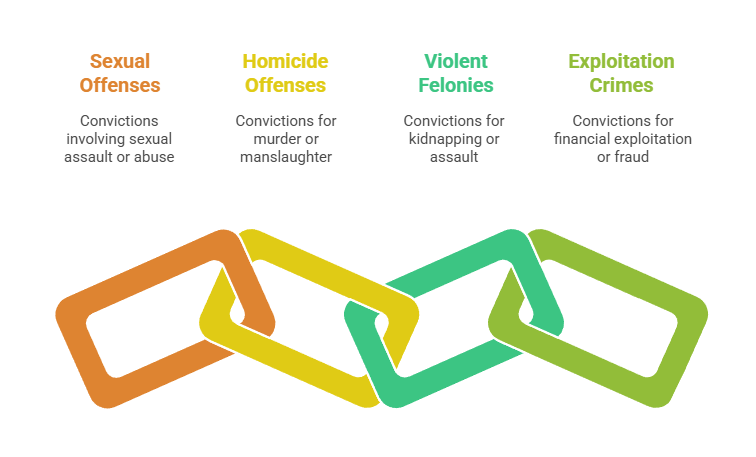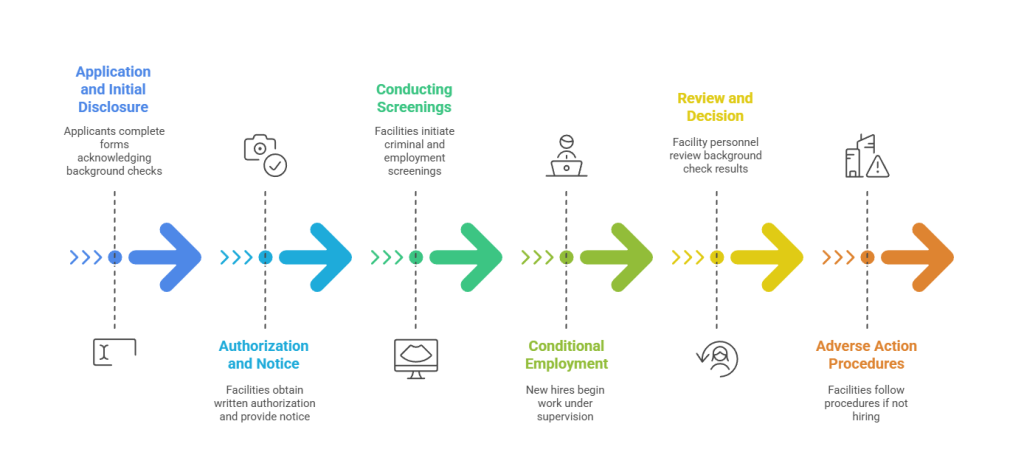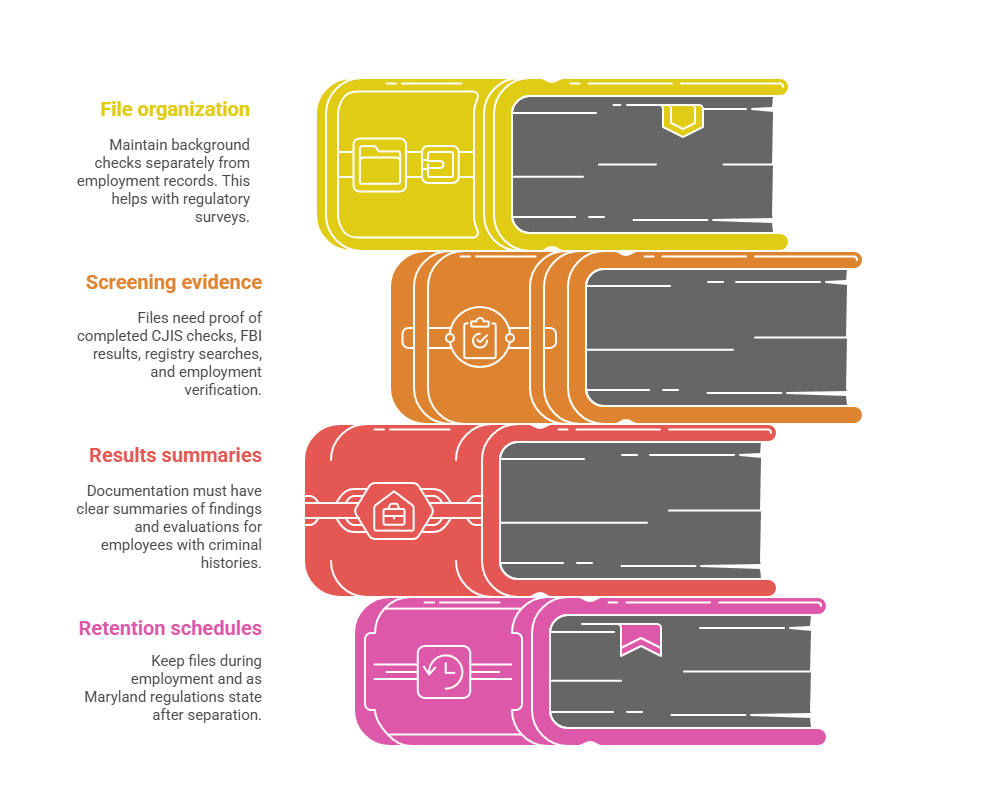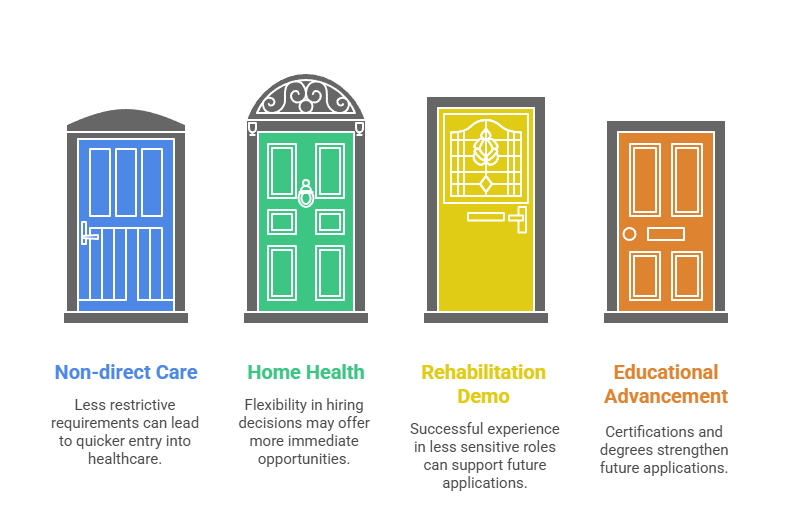Maryland nursing home background checks represent a comprehensive vetting process mandated by state regulations to protect vulnerable residents from potential harm. These screenings require facilities to conduct criminal history reviews, abuse registry searches, and employment verification before hiring any staff member with direct resident access. This multi-layered screening system is governed primarily by COMAR 10.07.02 and coordinated through the Maryland Department of Health. It establishes nursing homes as employers with heightened duty-of-care obligations that extend beyond standard employment practices to safeguard one of society's most at-risk populations.
Key Takeaways
- Maryland nursing homes must conduct state and federal criminal background checks through the Criminal Justice Information System (CJIS) for all employees with direct resident contact before their first day of work.
- The Health Care Worker Registry screening is mandatory and identifies individuals with substantiated findings of abuse, neglect, or misappropriation of vulnerable adult property across healthcare settings.
- Disqualifying offenses include violent crimes, sexual offenses, theft, fraud, and drug-related convictions, with specific lookback periods that can extend to lifetime bans depending on offense severity.
- Nursing home administrators face civil penalties ranging from $1,000 to $5,000 per violation for hiring employees without completing required background screenings.
- Conditional employment is permitted in Maryland, allowing new hires to begin work under direct supervision while awaiting final background check results, provided an initial screening shows no immediate disqualifiers.
- The Maryland Department of Health requires facilities to maintain background check documentation for all employees and make these records available during licensing surveys and complaint investigations.
- Annual rescreening is not mandated by Maryland law, but facilities must conduct new checks if an employee has a gap in healthcare employment exceeding certain timeframes or if concerns arise.
- Job seekers with criminal histories may still qualify for nursing home positions depending on the nature, age, and relevance of offenses, with rehabilitation evidence considered in some discretionary cases.
Understanding Maryland Nursing Home Background Check Requirements
Maryland nursing home background checks function as the first line of defense in protecting elderly and disabled residents from potential harm. The state's regulatory framework recognizes that nursing home environments create unique vulnerability scenarios. In these settings, residents often cannot advocate for themselves or report concerns effectively. These comprehensive screenings examine an applicant's entire history to identify red flags that might indicate unsuitability for working with this protected population.
The Maryland nursing home employee screening process begins before a conditional offer of employment. It continues through multiple verification stages after the initial application. Facilities must navigate both state-specific requirements outlined in the Code of Maryland Regulations (COMAR) and federal mandates from the Centers for Medicare & Medicaid Services. This dual compliance structure ensures that nursing homes meet baseline national standards while addressing Maryland's specific concerns about vulnerable adult protection.
Legal Framework Governing Healthcare Background Checks
COMAR 10.07.02 establishes the foundational requirements for Maryland healthcare background check compliance in skilled nursing facilities. These regulations specify which positions require screening, acceptable screening methods, disqualifying offenses, and documentation standards. The Maryland Department of Health Office of Health Care Quality enforces these provisions through regular surveys, complaint investigations, and penalty assessments for non-compliance. Facilities face significant consequences for failing to meet these requirements.
The federal requirement stems from the Patient Protection and Affordable Care Act Section 6201. This legislation mandates nationwide searches of abuse registries for long-term care employees. Maryland has integrated this federal requirement into state regulations, creating a unified screening approach. Facilities must demonstrate compliance with both regulatory layers to maintain their operating licenses and Medicare/Medicaid certification.
Positions Requiring Mandatory Screening
Background checks are mandatory for virtually all nursing home positions with the potential for direct resident contact or access to resident property. This broad definition captures clinical staff, dietary workers, housekeepers, maintenance personnel, activities coordinators, and administrative employees who might enter resident care areas. Maryland regulations take an inclusive approach, recognizing that vulnerable adults interact with many facility personnel beyond nursing staff. Therefore, the state requires comprehensive coverage of all positions that could affect resident safety.
The screening requirement extends to contractors, vendors, volunteers, and students who will have unsupervised access to residents or resident living areas. Facilities maintain responsibility for ensuring these non-employee workers complete appropriate background checks before providing services. This comprehensive coverage addresses the reality that residents encounter numerous individuals during their stay. Each person represents a potential risk if not properly vetted through Maryland's established screening protocols.
Components of a Complete Maryland Nursing Home Background Check

A compliant Maryland nursing home background check comprises multiple screening elements that collectively paint a picture of an applicant's suitability for working with vulnerable adults. Each component serves a distinct purpose. These elements examine different aspects of history and behavior that might indicate risk. Facilities must complete all required elements and document results before allowing unsupervised resident contact.
Criminal History Record Check Through CJIS
The Maryland Criminal Justice Information System (CJIS) criminal history check searches state databases for arrest records, charges, and convictions. This search covers all Maryland jurisdictions and provides the most comprehensive view of an applicant's in-state criminal history. Nursing homes access CJIS checks through approved channeling agencies or by submitting fingerprint cards directly to the Maryland Department of Public Safety and Correctional Services. The process typically moves quickly for most applicants.
CJIS results typically return within 3-5 business days for applicants without complex criminal histories. The report includes disposition information showing whether charges resulted in convictions, dismissals, probation before judgment, or other outcomes. Facilities must evaluate not just convictions but also pending charges and certain non-conviction dispositions when making hiring decisions. This comprehensive review ensures all relevant information informs the employment decision.
| Check Component | Coverage | Typical Turnaround |
| Maryland CJIS | State criminal records | 3-5 business days |
| FBI fingerprint check | Federal and multi-state | 3-10 business days |
Maryland law requires facilities to conduct both state and federal background checks. The FBI fingerprint-based check searches the National Crime Information Center database and Interstate Identification Index. This federal component captures criminal history from other states where the applicant previously lived or worked. It is critical because many nursing home employees have resided in multiple jurisdictions throughout their lives.
Health Care Worker Registry Search
The Maryland Health Care Worker Registry maintains records of individuals with substantiated findings of abuse, neglect, exploitation, or misappropriation of property against vulnerable adults in healthcare settings. This registry represents one of the most critical screening components. It identifies workers who have demonstrated harmful behavior specifically toward the population nursing homes serve. A positive registry finding creates an absolute bar to employment in most nursing home positions, with very limited exceptions.
Facilities access the registry through the Maryland Department of Health's online portal. Results typically return immediately in most cases. The search covers findings from Maryland nursing homes, assisted living facilities, home health agencies, and other healthcare providers required to report substantiated incidents. Registry inclusion typically results from employer investigations confirmed by state surveyors or from criminal convictions involving patient or resident victims.
Registry findings remain on file indefinitely in most cases. This creates permanent employment barriers for affected individuals. Maryland law provides limited appeal rights for workers disputing their registry inclusion, but successful removal is rare once findings are substantiated. This permanent consequence underscores the registry's role as the most severe employment barrier in healthcare background screening.
Employment History Verification
Employment verification confirms an applicant's work history accuracy and may reveal undisclosed gaps, terminations, or eligibility problems. Maryland nursing home hiring compliance requires facilities to contact previous healthcare employers directly. Facilities cannot rely solely on applicant-provided documentation. This direct verification often uncovers information applicants omitted from resumes or applications, including terminations for cause, performance issues, or unexplained departures.
Previous healthcare employers can provide limited information beyond dates of employment and position titles due to defamation concerns. However, many facilities participate in reciprocal information-sharing agreements. These agreements provide more detailed references when the inquiry comes from another healthcare employer conducting pre-employment screening. These professional networks help identify problematic workers who move between facilities hoping their histories won't follow them.
Disqualifying Offenses and Evaluation Criteria
Maryland regulations establish specific categories of criminal offenses that either absolutely bar nursing home employment or require careful evaluation before hiring decisions. Understanding these disqualification criteria helps both employers make compliant decisions and job seekers assess their employment prospects realistically. The severity, recency, and relevance of offenses all factor into the evaluation process. Facilities must document their decision-making rationale for regulatory compliance purposes.
Absolute Disqualifiers With No Review Period
Certain convictions create permanent bars to nursing home employment in Maryland with no possibility for waiver or time-based rehabilitation consideration. Maryland's absolute disqualifiers reflect the state's determination that some behaviors demonstrate fundamental unsuitability for vulnerable adult care. The list includes the most serious violent and sexual offenses where the risk to residents cannot be mitigated regardless of time elapsed or rehabilitation efforts completed.

- Sexual offenses: Any conviction involving sexual assault, abuse of a minor, or registration as a sex offender creates a permanent employment bar
- Homicide offenses: Murder, manslaughter, and felony murder convictions permanently disqualify applicants
- Violent felonies: Kidnapping, robbery with a dangerous weapon, and assault with intent to murder result in lifetime bans
- Exploitation crimes: Financial exploitation of vulnerable adults and identity fraud targeting elderly victims create permanent barriers
These permanent disqualifiers reflect Maryland's determination that certain behaviors demonstrate such fundamental unsuitability that no amount of time or rehabilitation can overcome the risk. Facilities have no discretion to hire applicants with these convictions. Attempting to do so exposes the nursing home to severe regulatory penalties and civil liability.
Time-Limited Disqualifiers Requiring Evaluation
Many criminal offenses create rebuttable presumptions against employment rather than absolute bars. These time-limited disqualifiers require facilities to conduct individualized assessments. The assessment process considers offense age, circumstances, rehabilitation evidence, and position requirements. Maryland healthcare background check requirements allow facilities to hire applicants with qualifying older convictions after demonstrating the decision protects resident safety.
Drug-related convictions illustrate the time-limited category's complexity. A ten-year-old marijuana possession conviction may not disqualify a dietary aide position. However, a three-year-old prescription fraud conviction would likely bar nursing assistant employment. Facilities must document their evaluation reasoning when hiring applicants with criminal histories within lookback periods. This documentation shows they considered resident safety implications throughout the decision-making process.
| Offense Category | Typical Lookback Period | Evaluation Factors |
| Theft and fraud | 7-15 years | Amount stolen, victim vulnerability, restitution completion |
| Drug offenses | 7-10 years | Substance involved, distribution vs. possession, treatment completion |
| Assault (non-felonious) | 10-15 years | Victim age/vulnerability, weapon involvement, anger management evidence |
The evaluation process should include reviewing court documents, obtaining the applicant's explanation, verifying rehabilitation program completion, and checking for subsequent offenses. Facilities that document thorough individualized assessments demonstrate good-faith compliance efforts. This documentation protects facilities even if regulatory surveyors later question the hiring decision.
Pending Charges and Non-Conviction Dispositions
Maryland nursing home administrators face difficult decisions when background checks reveal pending criminal charges without final dispositions. State law does not automatically bar employment based on arrests or charges alone. However, facilities must assess whether the alleged conduct, if true, would create resident safety concerns. This assessment requires balancing applicant rights against resident protection obligations.
Probation before judgment (PBJ) dispositions create particular complexity in healthcare background screening. While PBJ technically does not constitute a conviction under Maryland law, facilities may consider the underlying conduct when evaluating applicant suitability. A PBJ for theft, for example, reveals behavior relevant to nursing home employment even without a formal conviction. Facilities should consult legal counsel when navigating these nuanced situations to ensure compliance with both employment law and healthcare regulations.
The Maryland Nursing Home Background Check Process Step-by-Step

Efficient background screening processes help facilities fill positions quickly while maintaining regulatory compliance. A standardized workflow ensures consistent application of screening requirements across all positions. It also reduces the risk of overlooking required components. Maryland nursing homes typically establish multi-step processes that begin during the application phase and conclude with final documentation in employee personnel files.
Application and Initial Disclosure
The process begins when applicants complete disclosure forms acknowledging the background check requirement and authorizing the facility to obtain criminal history, employment verification, and registry information. The Fair Credit Reporting Act requires facilities to provide applicants with clear notice that background checks will be conducted. Facilities must also obtain written authorization before initiating screenings. These disclosure and authorization forms must use specific language to meet FCRA technical requirements and protect facilities from potential legal challenges.
Maryland law allows facilities to ask about criminal history on initial applications, though some jurisdictions have adopted "ban the box" restrictions. Even where permitted, many facilities defer detailed criminal history discussions until after initial screening to streamline the early application stages. This approach prevents applicants from self-selecting out due to minor convictions that wouldn't actually disqualify them after individualized assessment. It also expands the applicant pool in competitive hiring markets.
Conducting Required Screenings
Once authorization is obtained, facilities initiate the various screening components simultaneously to minimize overall turnaround time. The CJIS criminal background check requires fingerprint submission, either through live-scan digital capture or traditional ink cards. The Health Care Worker Registry search occurs through the Maryland Department of Health portal. Employment verification involves contacting previous employers directly via phone or written requests. Coordinating these components efficiently speeds the overall hiring timeline.
Conditional employment offers allow new hires to begin work under direct supervision while awaiting final background check results. Maryland regulations permit this practice provided the facility has completed initial screenings showing no immediate disqualifiers. The conditional employee must work under continuous supervision of a fully cleared staff member. They cannot have unsupervised resident contact until all screening components return with satisfactory results.
Review, Decision, and Documentation
When background check results arrive, designated facility personnel review findings against disqualification criteria and facility policies. Results showing no criminal history or registry findings proceed directly to final clearance. Results revealing criminal records or other concerns require individualized assessment following the facility's evaluation protocol. This assessment should involve human resources personnel, the hiring manager, and potentially legal counsel for complex situations.
Adverse action procedures apply when facilities decide not to hire based partially or entirely on background check results. The FCRA requires facilities to provide applicants with pre-adverse action notice. This notice must include a copy of the background check report and a summary of FCRA rights. Applicants receive time to dispute report accuracy before the facility makes a final decision. After the dispute period, facilities provide final adverse action notices if they proceed with the non-hire decision.
Compliance Challenges and Risk Management Strategies
Maryland nursing homes face ongoing compliance challenges in maintaining background check programs that meet all regulatory requirements while supporting operational needs. Common pitfalls include incomplete documentation, inconsistent application of disqualification criteria, and failure to screen all required positions. Proactive risk management strategies help facilities avoid these violations and the associated penalties. Consequently, developing robust systems protects both residents and the facility's operational license.
Documentation Requirements and Retention
Maryland regulations require facilities to maintain background check documentation for all employees with resident contact throughout their employment and for specified periods after separation. Facilities must document all required screening components, dates screenings occurred, and results summaries. Additionally, facilities must organize this documentation effectively for easy retrieval during regulatory surveys and investigations.

- Personnel file organization: Background check documents should be maintained in employee personnel files separate from general employment records to facilitate regulatory surveys
- Screening completion evidence: Files must contain proof that CJIS checks, FBI fingerprint results, registry searches, and employment verification were completed for each employee
- Results summaries: Documentation should include clear summaries of findings and any evaluations conducted for employees with criminal histories
- Retention schedules: Files must be retained throughout employment and for periods specified by Maryland regulations after employment separation
Incomplete documentation represents one of the most common background check citations during Maryland Department of Health surveys. Surveyors specifically verify that facilities can produce evidence of all required screenings for each employee. Missing documentation for even one employee can result in compliance citations and penalties, regardless of whether the screenings actually occurred.
Managing Conditional Employment Periods
While conditional employment allows operational flexibility, it creates compliance risks if not managed carefully. Facilities must ensure conditionally employed workers truly work under direct supervision without any unsupervised resident access. This requirement is challenging in understaffed facilities where supervision resources are limited. Violations occur when conditionally employed workers are assigned to resident care independently before final clearance. Therefore, facilities need clear protocols and monitoring systems.
Best practices include limiting conditional employment to 30 days maximum. Facilities should assign specific supervisors responsible for overseeing conditional workers. They should also implement tracking systems that alert management when conditional periods exceed established timeframes. Facilities should establish protocols for immediately removing conditional employees from resident care duties if background checks return with disqualifying information.
Handling Employees With Criminal Histories
Facilities that choose to hire applicants with evaluated criminal histories should implement risk mitigation strategies beyond the initial assessment. These strategies might include additional training on professional boundaries, more frequent performance evaluations, and supervision plans tailored to the specific concerns raised by the criminal history. Documented ongoing monitoring helps demonstrate the facility's commitment to resident safety if questions arise later. This proactive approach protects both residents and the facility's compliance standing.
Clear policies establishing which convictions are absolute disqualifiers versus which warrant individualized assessment help ensure consistent application across all applicants. These policies should specify lookback periods for various offense categories. They should also identify factors the facility will consider during evaluations. Consistent policy application protects facilities from discrimination claims while maintaining resident safety standards.
Background Check Implications for Job Seekers
Job seekers with criminal histories face significant barriers to nursing home employment, but not all convictions create absolute disqualification. Understanding how Maryland facilities evaluate criminal records helps applicants assess their employment prospects realistically and present their cases most effectively. Transparency about criminal history during the application process typically yields better outcomes than attempting to conceal information that background checks will reveal. Moreover, proactive disclosure demonstrates honesty and accountability to potential employers.
Disclosure Strategies for Applicants With Records
Applicants should disclose criminal histories proactively when applications ask about convictions. They should provide context that humanizes the circumstances without minimizing responsibility. Brief explanations highlighting rehabilitation efforts, time elapsed since the offense, and lessons learned help facilities understand the person beyond the criminal record. Documentation supporting rehabilitation claims strengthens applications significantly.
Supporting documentation might include completion certificates from treatment programs, character references, or evidence of community involvement. These materials demonstrate personal growth since the offense occurred. They also show commitment to positive change. Applicants should organize this documentation professionally and present it alongside their criminal history disclosure. This comprehensive presentation helps facilities conduct thorough individualized assessments that may lead to favorable hiring decisions despite past mistakes.
Maryland law prohibits facilities from asking about expunged or shielded criminal records. Applicants may legally deny these offenses exist on applications and during interviews. Expungement removes criminal records from public databases, preventing their appearance on most background checks. Job seekers with qualifying convictions should explore expungement possibilities before beginning healthcare job searches, as this option provides the cleanest path to employment.
Alternative Healthcare Career Paths
Applicants with disqualifying nursing home convictions might qualify for other healthcare positions with less stringent background check requirements. Home health aide positions, medical office roles, and non-patient-contact healthcare support jobs sometimes accept applicants who cannot pass nursing home screenings. These alternative paths allow individuals to build healthcare careers while demonstrating rehabilitation. Success in these roles may later open nursing home opportunities as time passes and rehabilitation becomes more evident.

- Non-direct care positions: Medical billing, coding, and administrative roles often have less restrictive background requirements
- Home health opportunities: Some home care agencies have greater flexibility in hiring decisions than institutional providers
- Rehabilitation demonstration: Several years of successful healthcare employment in less sensitive roles can support future nursing home applications
- Educational advancement: Pursuing certifications and degrees while working in alternative roles strengthens future applications
Job seekers should research specific employer policies rather than assuming all healthcare opportunities are foreclosed by criminal histories. Maryland's healthcare sector faces significant workforce shortages. This creates pressure on some employers to consider applicants they might have rejected in tighter labor markets. Persistence, continued education, and documented rehabilitation efforts eventually open doors for many individuals with criminal pasts.
Maintaining Ongoing Compliance in Your Facility
Background check compliance is not a one-time achievement but an ongoing operational requirement demanding continued attention. Maryland nursing homes must monitor regulatory updates, maintain documentation systems, train personnel on screening protocols, and respond promptly to compliance concerns. Facilities with strong compliance cultures embed background check requirements into standard hiring workflows rather than treating them as administrative afterthoughts. This integration ensures consistent application across all hiring decisions throughout the year.
Annual Compliance Audits and Staff Training
Annual internal audits of background check files help identify documentation gaps before regulatory surveyors discover them. These audits should verify that files contain all required screening components. They should also confirm screenings were completed within appropriate timeframes. Additionally, audits should review documented evaluations for any employees with criminal histories. Facilities should develop remediation plans immediately upon discovering missing documentation, conducting delayed screenings and updating files where possible.
Staff training ensures that human resources personnel, hiring managers, and administrators understand background check requirements and their roles in the compliance process. Training should cover screening component requirements, conditional employment protocols, disqualification criteria, FCRA obligations, and documentation standards. Annual refresher training keeps these requirements front-of-mind as staff process numerous hires throughout the year. Well-trained staff prevent compliance violations before they occur.
Responding to New Criminal Activity
Facilities face difficult situations when learning about current employees' arrests or convictions occurring during their employment. Maryland law does not require annual rescreening. However, facilities should establish protocols for addressing new criminal activity when they become aware of it. These protocols typically include immediate investigation, temporary reassignment away from resident care pending review, and evaluation of whether the offense warrants termination. Clear protocols protect both residents and employee rights during these sensitive situations.
Employee self-reporting policies encourage workers to disclose arrests and charges promptly rather than allowing facilities to learn about criminal activity through other channels. These policies should clarify which types of offenses require reporting. They should also establish confidential reporting mechanisms that protect employee privacy while ensuring facility awareness. While self-reporting policies cannot prevent all problematic situations, they provide a framework for addressing issues proactively rather than reactively.
Conclusion
Maryland nursing home background checks represent comprehensive screening processes designed to protect vulnerable residents from potential harm by thoroughly vetting all individuals with resident access. These multi-layered requirements encompass criminal history checks, abuse registry searches, and employment verification. They establish nursing homes as healthcare providers with heightened compliance obligations that exceed standard employment practices. Facilities that implement robust background check programs with consistent processes, thorough documentation, and ongoing monitoring protect both their residents and their operational licenses from the serious consequences of compliance failures. As Maryland's healthcare landscape continues evolving in 2025 and beyond, nursing home administrators must maintain vigilant attention to vulnerable adult protection screening requirements while job seekers with criminal histories should approach opportunities with honesty, evidence of rehabilitation, and realistic understanding of qualification standards.
Frequently Asked Questions
How long does a Maryland nursing home background check take to complete?
Complete Maryland nursing home background checks typically take 7-14 business days when all screening components are initiated simultaneously. Timelines vary based on applicant criminal history complexity, previous employment responsiveness, and current CJIS/FBI processing volumes. Facilities often use conditional employment provisions to allow new hires to begin work under supervision within 3-5 days after initial screenings clear. Final clearance is granted once all components return satisfactory results.
Can I work in a Maryland nursing home with a felony conviction?
Employment eligibility with a felony conviction depends on the specific offense, how long ago it occurred, and the nursing home position sought. Certain felonies including murder, sex offenses, and violent crimes create permanent employment bars. Other felonies like older drug offenses or non-violent crimes may allow employment after individualized facility assessment. Facilities consider rehabilitation evidence and resident safety implications when making these decisions.
Do Maryland nursing homes check out-of-state criminal records?
Yes, Maryland nursing home employee screening includes FBI fingerprint-based background checks that search national databases. These searches capture criminal records from all states where applicants previously lived or were arrested. This federal screening component ensures facilities identify relevant criminal history beyond Maryland's borders. The multi-state search addresses the reality that many healthcare workers have multi-state residential and employment histories.
How much do nursing home background checks cost in Maryland?
Maryland nursing home background check costs typically range from $75-150 per applicant. This includes CJIS state criminal history ($18), FBI fingerprint check ($50-75), Health Care Worker Registry search (no fee), and employment verification expenses. Most facilities absorb these screening costs as business expenses rather than charging applicants. Facilities treat background checks as essential investments in resident safety and regulatory compliance.
What is the Maryland Health Care Worker Registry and how does it affect employment?
The Maryland Health Care Worker Registry maintains records of individuals with substantiated findings of abuse, neglect, exploitation, or misappropriation of vulnerable adult property in healthcare settings. A positive registry finding creates an absolute bar to employment in most nursing home positions. The registry demonstrates documented harmful behavior specifically toward vulnerable populations. Findings typically remain on the registry indefinitely with limited appeal rights.
Can nursing homes hire employees with pending criminal charges?
Maryland law does not automatically prohibit nursing home employment based on pending criminal charges without convictions. However, facilities must assess whether the alleged conduct, if proven, would create resident safety concerns. Many facilities choose to delay hiring decisions until criminal cases resolve. Others implement enhanced supervision plans for employees with pending charges involving potentially disqualifying offenses.
How often must Maryland nursing homes rescreen existing employees?
Maryland regulations do not mandate annual rescreening of existing nursing home employees who remain continuously employed in the same facility. However, facilities must conduct new background checks when employees return after significant gaps in healthcare employment. They must also rescreen when credible information suggests new criminal activity or registry-reportable conduct occurred during employment. Specific facility policies determine these triggering events.
What happens if a background check error shows incorrect criminal history?
Applicants who identify inaccurate information on background check reports have legal rights under the Fair Credit Reporting Act to dispute errors with the screening company. The FCRA requires background check companies to investigate disputes within 30 days and correct or remove inaccurate information. Nursing homes must provide applicants copies of reports and dispute rights notices before making adverse employment decisions. This process protects applicants from decisions based on incorrect information.
Additional Resources
- Maryland Department of Health - Office of Health Care Quality Nursing Home Regulations
https://health.maryland.gov/ohcq/pages/home.aspx - Code of Maryland Regulations (COMAR) 10.07.02 - Comprehensive Care Facilities
https://dsd.maryland.gov/pages/CodeOfMarylandRegulationsHome.aspx - Maryland Health Care Worker Registry Search Portal
https://health.maryland.gov/ohcq/Pages/RegistrySearch.aspx - Maryland Criminal Justice Information System (CJIS) Background Check Information
https://www.dpscs.state.md.us/aboutdpscs/cjis.shtml - Federal Trade Commission - Fair Credit Reporting Act Compliance Guide for Employers
https://www.ftc.gov/business-guidance/resources/using-consumer-reports-what-employers-need-know - Centers for Medicare & Medicaid Services - Background Check Requirements for Long-Term Care Facilities
https://www.cms.gov/Medicare/Provider-Enrollment-and-Certification/SurveyCertificationGenInfo

GCheck Editorial Team
Meet the GCheck Editorial Team, your trusted source for insightful and up-to-date information in the world of employment background checks. Committed to delivering the latest trends, best practices, and industry insights, our team is dedicated to keeping you informed.
With a passion for ensuring accuracy, compliance, and efficiency in background screening, we are your go-to experts in the field. Stay tuned for our comprehensive articles, guides, and analysis, designed to empower businesses and individuals with the knowledge they need to make informed decisions.
At GCheck, we're here to guide you through the complexities of background checks, every step of the way.





